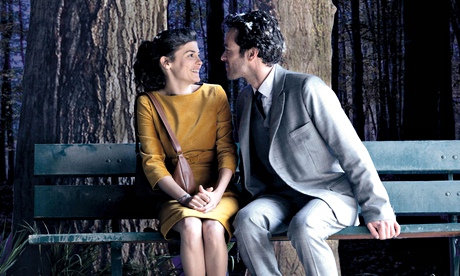
Mood Indigo, out this week and starring Romain Duris and Audrey Tautou, is adapted from Boris Vian's L'Ecume des Jours. But how did the novelist find the time to write it? In occupied wartime Paris, he was an engineer by day and a jazz trumpeter by night – and also a host to visiting American jazzmen such as Duke Ellington and Miles Davis. He was Jean-Paul Sartre's licensed jester, writing a joky column ("liar's news") for Sartre's otherwise grim magazine Les Temps Modernes, sending up the unlikely emergence of "Jean-Sol Partre" as a celebrity in L'Ecume, and connecting Sartre and Simone de Beauvoir with the so-called "existentialist cellars" in St Germain des Prés where Vian and Juliette Greco performed (relations became frostier, however, when Sartre began an affair with Michelle Vian – the dedicatee of L'Ecume and model for its heroine – although by 1949 the Vians' marriage was already heading for divorce).
Vian is also credited with launching Serge Gainsbourg's career, making St Tropez the place where trendy Parisians holidayed, possibly shaping the freewheeling spirit of Jean-Luc Godard's early films, and helping to inspire the student revolt of May 1968.
Even pigeon-holing him as someone out to make the world merrier is too limiting for the protean Vian, as he wrote three bloody pastiches of US pulp fiction, posing as American author "Vernon Sullivan", and was prosecuted and fined after a tabloid furore when a copy of the most notorious, I Will Spit on Your Graves, was found in the hotel room of a married man who had shot his lover and then himself.
Published in 1947, L'Ecume starts as romcom and ends as tragedy. But its originality lies in the fantastical world Vian conjures around his protagonists Colin and Chloe; and in the jazz-like playful prose that has led critics to link him with Raymond Queneau and Georges Perec as post-surrealist "comedians of language".
Michelle, now in her 90s, was able to attend a screening of Michel Gondry's film in Paris, but Vian died in 1959, aged only 39 – he may in fact be the only author ever killed by seeing his work adapted, as he collapsed mid-protest (his last words may have been "My arse!") at a screening of a film of I Will Spit on Your Graves.

